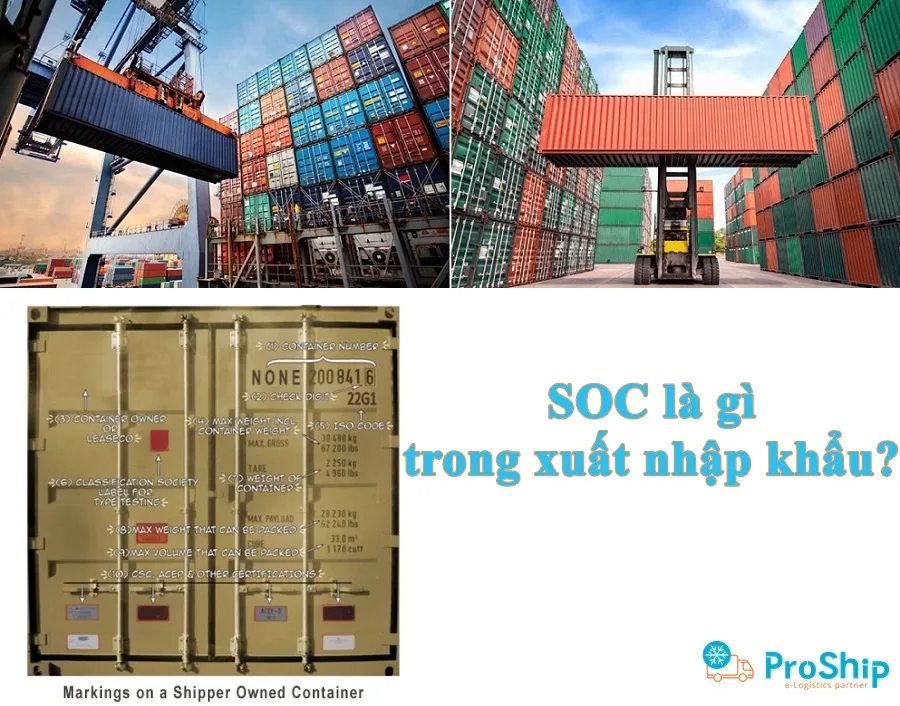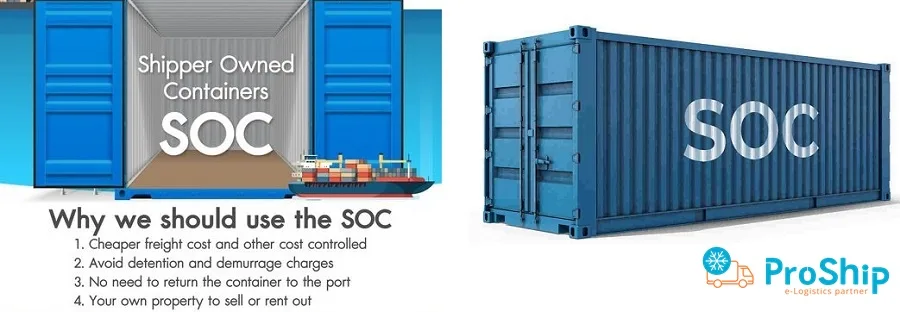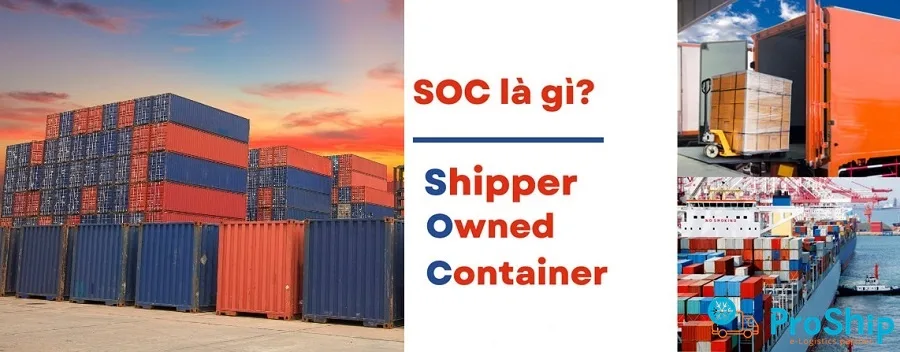x Bạn đang hoạt động trong lĩnh vực Logistics, xuất nhập khẩu cần tìm hiểu container SOC – Là viết tắt của từ gì?
x Bạn muốn biết lợi ích của SOC là gì, khi nào mới được sử dụng cont này?
x Bạn thắc mắc việc sử dụng SOC trong xuất nhập khẩu có ưu điểm hay nhược điểm gì không?
Với một số người mới tìm hiểu về lĩnh vực XNK hẳn vẫn chưa hiểu SOC là gì? Vậy nên, Proship.vn chúng tôi sẽ cập nhật kiến thức chuyên ngành về Shipper owned containers, gồm khái niệm, lợi ích, ưu nhược điểm của SOC và chỉ ra sự khác biệt của SOC so với COC cho các bên liên quan nắm rõ để chọn được loại container phù hợp.
Thuật ngữ SOC trong xuất nhập khẩu là gì?
SOC là thuật ngữ được sử dụng khá phổ biến trong ngành xuất nhập khẩu hàng hóa. Vậy, SOC là gì? SOC là tên viết tắt của “Shipper Owned Container” – thuật ngữ ám chỉ việc đối tượng nào là người sở hữu cont xuất nhập khẩu hàng hóa.
Theo định nghĩa, SOC nói về các loại cont thuộc sở hữu riêng của Shipper. Đối với hình thức SOC thì Consignee sau khi kéo cont về kho riêng lấy hàng sẽ được tự do sử dụng, không phải trả rỗng hay phí DEM/DET nào cho hãng tàu. Sau khi container được sử dụng xong, có thể tái xuất trả lại cho shipper hoặc sử dụng cho mục đích khác tùy thỏa thuận của các bên khi ký kết.

Trên thực tế, container có thể thuộc về khá nhiều bên như: Hãng tàu, Công ty bán container, Các công ty kinh doanh lĩnh vực vận tải (Carrier), Shipper.
SOC có thể sử dụng trong các trường hợp sau:
- Khi người gửi hàng cần vận chuyển hàng hóa đến các khu vực có điều kiện giao thông khó khăn;
- Khi người gửi hàng cần vận chuyển hàng theo yêu cầu riêng của khách;
- Khi người gửi hàng cần vận chuyển hàng hóa đến các khu vực có quy định an ninh đặc biệt.
Phân biệt container SOC và container COC
Bên cạnh SOC, chúng ta có thể bắt gặp thêm khái niệm về COC. Nếu SOC ám chỉ container của Shipper thì COC “Carrier Owned Container”, ám chỉ container của hãng tàu.
Để phân biệt được Cont SOC và Cont COC, bạn có thể nhìn vào các thông tin trên container như:
Về số hiệu trên container
Nếu bốn chữ cái đầu của số hiệu cont trùng với tên viết tắt của hãng tàu (ví dụ: HLXU, MSCU, CGMU,…) thì đó là Cont COC. Nếu bốn chữ cái đầu của số hiệu container là NONE hoặc khác với tên viết tắt của hãng tàu thì đó là Cont SOC.
Về logo trên container
Nếu container có logo của hãng tàu (ví dụ: Maersk, MSC, CMA-CGM,…) thì đó là Cont COC. Nếu container không có logo hoặc có logo của shipper, forwarder hoặc nhà vận chuyển không tàu thì đó là Cont SOC.
Lợi ích của SOC Shipper owned containers
Đối với việc sử dụng cont SOC sẽ giúp người gửi hàng đảm bảo được khả năng kiểm soát, có tính linh hoạt, chủ động hơn trong quá trình vận chuyển hàng hóa. Dưới đây là một số lợi ích phải kể đến của Shipper owned containers:
Kiểm soát chuỗi cung ứng
Những người gửi hàng có thể kiểm soát được container và chủ động trong quá trình cung cấp container đóng hàng.
Ở một số nơi, vì sự mất cân đối giữa lượng hàng nhập và xuất nên số lượng container có sẵn sẽ khan hiếm nên sử dụng SOC sẽ tối ưu hơn.
Kiểm soát các chi phí
Trong thực tế, việc bạn sử dụng SOC sẽ khiến cho quá trình gửi hàng của bạn an toàn hơn. Không những vậy, bạn tiết kiệm được chi phí lưu container tại bãi, đặc biệt là đối với những nơi có thủ tục xuất nhập khẩu phức tạp.
Hay có nhiều yếu tố thông quan hoặc rủi ro tiềm ẩn bị gây khó dễ bởi những người quản lý và vận hành cảng biển.

Giảm thiểu rủi ro
Việc sử dụng container SOC giúp giảm thiểu rủi ro việc chọn nhầm cont xấu, hư hỏng hàng hóa và đảm bảo an toàn cho quá trình vận chuyển. Điều này giúp bảo vệ hàng hóa khỏi những yếu tố thời tiết bất lợi như mưa lớn, bão lũ, giữ hàng hóa không hư hại.
Linh hoạt và chủ động
Sử dụng SOC Container giúp người gửi hàng kiểm soát và chủ động hơn trong quá trình vận chuyển. Đặc biệt hiệu quả đối với những nơi có thủ tục xuất nhập khẩu phức tạp hoặc nguy cơ rủi ro tiềm ẩn tại cảng biển.
>>Xem thêm: Chứng chỉ CDCS là gì?
Ưu nhược điểm của SOC trong xuất nhập khẩu
Ưu điểm, nhược điểm của SOC là gì trong xuất nhập khẩu sẽ được Proship chia sẻ như sau:
Ưu điểm khi sử dụng SOC
Container SOC có những ưu điểm sau:
- Người gửi hàng có thể kiểm soát được chi phí vận chuyển;
- Người gửi hàng có thể đảm bảo an toàn cho hàng hóa;
- Người gửi hàng có thể tiết kiệm thời gian và công sức.
Nhược điểm khi sử dụng SOC
Song, container SOC cũng có những nhược điểm:
- Chi phí ban đầu: Người gửi hàng phải đầu tư chi phí mua hoặc thuê container SOC. Chi phí này có thể khá lớn, đặc biệt là đối với cont mới;
- Khó khăn trong việc quản lý: Người gửi hàng cần có hệ thống quản lý hiệu quả để theo dõi vị trí và trạng thái của container SOC;
- Trách nhiệm bảo quản và vận hành: Người gửi hàng phải chịu trách nhiệm bảo quản, vận hành cont SOC. Điều này có thể đòi hỏi thời gian, công sức.

Một số ví dụ về nhược điểm của SOC trong xuất nhập khẩu:
- Nếu người gửi hàng mua cont SOC, họ sẽ phải trả khoản tiền lớn ngay từ đầu nên có thể gây khó khăn cho người gửi hàng có nguồn vốn hạn chế;
- Nếu người gửi hàng thuê cont SOC, họ sẽ phải trả tiền thuê hàng tháng hoặc hàng năm nên có thể làm tăng chi phí vận chuyển tổng thể;
- Người gửi hàng cần có kiến thức và kinh nghiệm về vận tải container để bảo quản, vận hành cont SOC an toàn, hiệu quả. Nếu không, họ có thể gặp phải các vấn đề như container bị hư hỏng, hàng hóa bị mất mát hoặc hư hỏng;
- Người gửi hàng cần có hệ thống quản lý hiệu quả để theo dõi vị trí và trạng thái container SOC. Điều này có thể đòi hỏi chi phí và thời gian.
Proship Logistics đã làm rõ định nghĩa Soc là gì, Shipper owned containers có những lợi ích và ưu điểm gì. Theo đó, những ai mới tham gia vào lĩnh vực xuất nhập khẩu, logistics chưa hiểu rõ về cont SOC có thể cập nhật kiến thức từ bài chia sẻ này để phục vụ hiệu quả cho công việc….và khi có nhu cầu sử dụng dịch vụ tại Proship, liên hệ ngay 0909 344 247.

